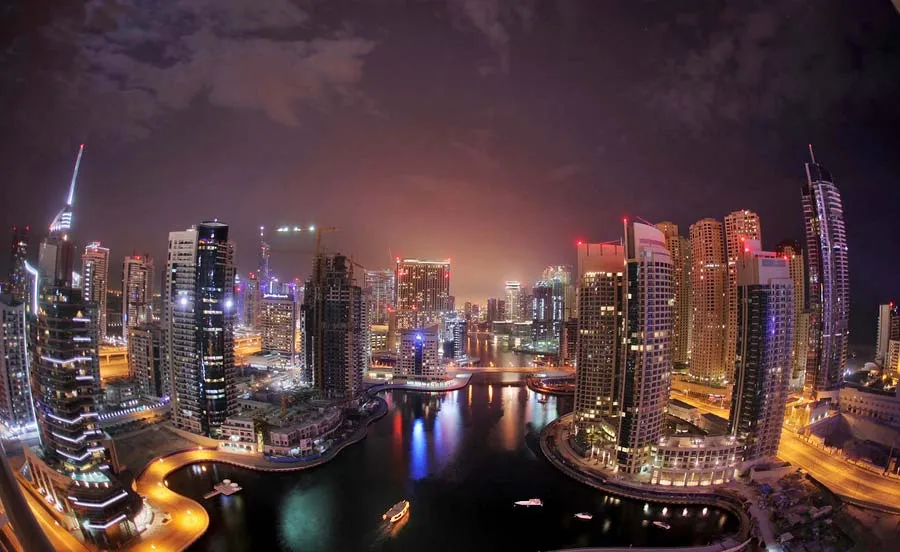Dubai, a city of global fame, is synonymous with luxury, innovation, and breathtaking architectural marvels. Located in the United Arab Emirates (UAE), Dubai has transformed from a modest fishing village to one of the world’s most dynamic and futuristic cities. This quick guide explores where Dubai is geographically, its cultural and economic significance, and what makes it a magnet for travelers and investors.
Where is Dubai Located?
Dubai is situated on the southeastern coast of the Arabian Peninsula, bordered by the Arabian Gulf (commonly referred to as the Persian Gulf). It is one of the seven emirates that make up the UAE. To understand Dubai’s geographical position:
- Region: Dubai is part of the Middle East, nestled between Europe, Asia, and Africa, making it a strategic hub for trade and travel.
- Latitude and Longitude: The city lies approximately at 25.276987° N latitude and 55.296249° E longitude.
- Neighboring Areas: It shares borders with Abu Dhabi, the UAE’s capital, to the south, and Sharjah to the northeast. The Gulf’s waters stretch along Dubai’s western coastline.
Dubai’s Geography and Climate
Dubai’s terrain is a mix of desert landscapes and coastal areas. The city is famous for its sandy beaches, artificial islands, and futuristic skyline juxtaposed against a backdrop of golden dunes. The climate is arid, with extremely hot summers and mild winters, making it a year-round destination for many.
Historical Context of Dubai’s Location
Historically, Dubai’s position on the trade routes between Mesopotamia, the Indus Valley, and East Africa played a significant role in its development. The city was a prominent stop for traders dealing in spices, pearls, and textiles. Over time, its strategic location attracted settlers and merchants from around the world, shaping its multicultural identity.
Significance of Dubai’s Location
Dubai’s location is pivotal to its success on multiple fronts:
- Global Connectivity: Dubai is less than an eight-hour flight from two-thirds of the world’s population. This central location makes it a preferred stopover for travelers and a vital hub for airlines, especially Emirates Airlines.
- Trade and Commerce: The city’s proximity to major shipping routes through the Strait of Hormuz enhances its status as a global trade center. Dubai’s Jebel Ali Port is the largest in the Middle East and a cornerstone of international maritime logistics.
- Tourism: Dubai’s location along the Arabian Gulf makes it a prime destination for luxury tourism. From pristine beaches to iconic landmarks like the Burj Khalifa and Palm Jumeirah, Dubai attracts millions of visitors annually.
- Cultural Crossroads: Situated at the intersection of Asia, Africa, and the Middle East, Dubai serves as a melting pot of cultures. This diversity is evident in its culinary scene, art galleries, and vibrant festivals.
Economic Significance of Dubai
Dubai is not just a geographically strategic location but also a global economic powerhouse. Here’s why:
- Business Hub: The city is a global center for finance, technology, and innovation. Free zones like Dubai Internet City and Dubai International Financial Centre (DIFC) have attracted multinational corporations, startups, and entrepreneurs.
- Oil and Diversification: Unlike Abu Dhabi, Dubai’s economy is not heavily reliant on oil. Although oil revenue initially fueled its growth, Dubai diversified its economy into real estate, tourism, aviation, and retail.
- Real Estate and Infrastructure: Mega-projects like the Burj Khalifa, Dubai Marina, and the Dubai Mall exemplify its booming real estate and construction sectors.
- Expo 2020 Legacy: Hosting Expo 2020 (held in 2021 due to the pandemic) cemented Dubai’s status as a global city. The event attracted millions and showcased Dubai as a hub for sustainability, mobility, and innovation.
Dubai’s Cultural and Social Significance
Despite its modern appearance, Dubai retains its cultural heritage and traditions. The city celebrates Emirati culture through initiatives like the Sheikh Mohammed Centre for Cultural Understanding, traditional markets (souks), and the preservation of historical districts like Al Fahidi.
Dubai’s population is predominantly expatriate, with people from over 200 nationalities living and working there. This multiculturalism fosters a cosmopolitan vibe, blending traditions with modernity.
Why Visit Dubai?
Dubai’s appeal lies in its unique combination of natural beauty, cutting-edge architecture, and luxury experiences. Here are some key attractions:
- Architectural Wonders: The Burj Khalifa, the world’s tallest building, offers panoramic views of the city. The Museum of the Future and the Dubai Frame are newer landmarks showcasing innovation and design.
- Man-Made Islands: Projects like Palm Jumeirah and The World Islands highlight Dubai’s engineering marvels.
- Shopping and Entertainment: Dubai Mall and Mall of the Emirates are not just shopping destinations but also hubs for entertainment, housing aquariums, ski slopes, and cinemas.
- Desert Adventures: Visitors can explore the desert through dune bashing, camel rides, and Bedouin-style dining.
How to Get to Dubai
Dubai International Airport (DXB) is one of the busiest airports globally, serving as a gateway to the city. Its efficient public transportation system, including the Dubai Metro, makes navigating the city seamless.
Conclusion
Where is Dubai, at the crossroads of continents and cultures, has been instrumental in its rise to global prominence. From its role as a trading port to its status as a hub for tourism, finance, and innovation, Dubai exemplifies how geography can shape destiny. Whether you’re drawn to its luxurious lifestyle, business opportunities, or rich cultural heritage, Dubai is a city like no other—modern yet deeply rooted in tradition, and ever-evolving while preserving its unique identity.



